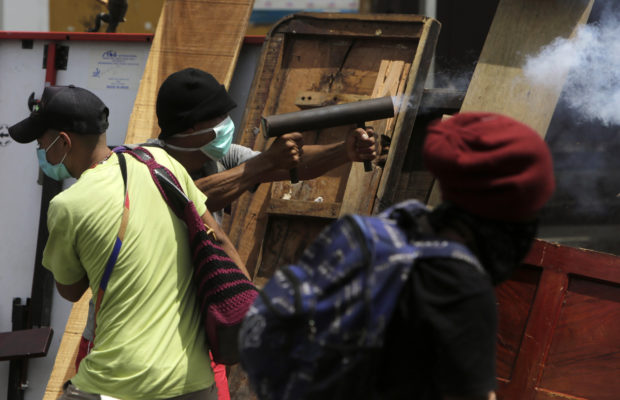Pope Francis calls for dialogue as Nicaragua violence escalates

A demonstrator fires a home-made mortar against riot police during protests in Monimbo neighborhood in Masaya, some 40 kilometers from Managua on June 2, 2018. The death toll from weeks of violent unrest in Nicaragua rose to more than 100 as embattled President Daniel Ortega rejects calls to step down and the Catholic church, which has tried to mediate the conflict, refuses to resume the dialogue. (AFP PHOTO / INTI OCON)
Pope Francis has called for dialogue in Nicaragua after new clashes killed at least seven people, the latest bloodshed in weeks of anti-government protests that have left more than 100 dead.
The Church has tried to mediate in the escalating crisis in the Central American country but called off peace talks with President Daniel Ortega’s government last week after a Mother’s Day demonstration in support of victims’ moms was met with gunfire, killing at least 16 people.
Violence again erupted on Saturday, as protesters fired homemade mortars to fend off a police crackdown in the city of Masaya, near the capital Managua.
The new unrest left at least seven people dead, including an American citizen reportedly killed by a pro-government mob in a separate incident in Managua, according to rights groups.
“I am united with my brother bishops in Nicaragua and their grief over violence committed by armed groups,” Pope Francis said at the Vatican on Sunday.
Article continues after this advertisement“The Church is always in favor of dialogue but for that, it requires an active commitment to respect freedom and, above all, life,” he added.
Article continues after this advertisementAt Mass in Managua’s Metropolitan Cathedral, Father Luis Herrera said he was praying for the victims of “police repression.”
The violence has now claimed 110 lives since it erupted on April 18, according to the Nicaraguan Center for Human Rights.
Church caught in crossfire
The Nicaraguan Bishops’ Conference aborted its attempt to mediate in the conflict after the deadly crackdown on Wednesday’s march, saying the dialogue was impossible as long as “the people continue to be repressed and killed” by “groups close to the government.”
The Catholic Church has been increasingly caught up in the conflict.
On Saturday, Silvio Jose Baez, the auxiliary bishop of Managua, warned residents of flashpoint city Masaya to stay indoors over reports of pro-government snipers shooting people in the street.
A church in central Masaya later opened its doors to give refuge and medical care to 21 residents, who had been detained and reportedly abused by police.
The Church and the Nicaraguan Association for the Protection of Human Rights (ANPDH) obtained the release of 11 more detainees on Sunday, most of whom had clearly been beaten.
“I’m just a paramedic,” said one young woman who declined to give her name, adding that she had been arbitrarily arrested and beaten in Masaya.
“They beat my son all over, on his stomach, on his head,” said a sobbing Antonia Gonzalez, whose 25-year-old son Luis was one of those detained on what his family called fabricated looting charges.
Cardinal emeritus dies
Ortega, the man who has dominated Nicaraguan politics for the past four decades, had been seen as close to the Church in recent years.
One of his key allies, cardinal emeritus Miguel Obando, died on Sunday at age 92, the Church announced.
Obando and Ortega had a love-hate relationship stretching back to the 1970s.
Obando, like the president, was a sharp critic of the dictator Anastasio Somoza, who was ousted by Ortega’s Sandinista guerrilla army in 1979.
He later turned his criticism on the newly installed Sandinista junta led by Ortega for its communist ideology, alleged human rights violations, and vision of a “people’s church” based on leftist liberation theology.
But as Ortega – who lost the presidency in a 1990 election – charted his eventual return to power in 2007, he courted the cardinal’s favor with a mix of progressive social policy and support for a total abortion ban.
Obando even presided over Ortega’s 2005 wedding to his current vice president, Rosario Murillo.
Former bastion
But the Catholic Church has distanced itself from Ortega’s government over the protest crackdown.
The church in Masaya has sheltered opposition supporters from attacks by riot police and pro-government paramilitaries, and church bells have become the warning cry that residents use when riot police arrive.
Once a bastion of support for the Sandinistas, the city of just over 100,000 people looked like a war zone on Sunday.
Residents have put up barricades to keep out riot police and protect themselves from what they said were police and paramilitary snipers.
Ortega, whose third consecutive term is due to end in 2022, denied his forces were killing protesters. His government accused “right-wing groups” of conspiring to “terrorize” the country. /kga